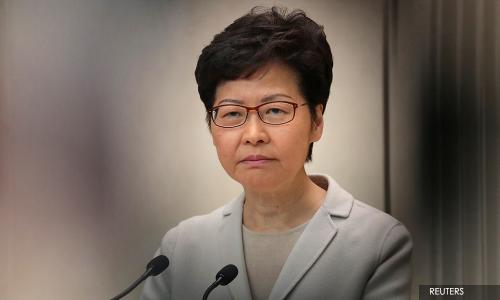Hong Kong reshuffles gov't as debate rages over Beijing's role
Hong Kong unveiled a government shake-up on Wednesday that it said was aimed at reviving the financial hub's beleaguered economy and had nothing to do with the recent controversy over Beijing's role in the city's affairs.
Director of Immigration, Erick Tsang, will replace Patrick Nip as head of the Constitutional and Mainland Affairs Bureau, Hong Kong leader Carrie Lam (above) said, shortly after China's state council said it had approved the appointments.
The move comes two days after Nip apologised for conflicting statements over the role of two Beijing institutions overseeing the global financial centre's affairs.
Nip has been reassigned as the head of the city's civil service, replacing Joshua Law.
"Hong Kong is in a very difficult position now, apart from the pandemic, we are going through a major economic recession with high unemployment and so we really need to start planning for Hong Kong's economic recovery," Lam said at a briefing.
The government also announced new secretaries for technology, financial services and home affairs.
Some lawmakers said the moves reflected Beijing's tightening grip over the city.
"This is not an ordinary reshuffle. This is a show of power," Civic Party lawmaker Alvin Yeung told Reuters.
Political tensions have escalated in Hong Kong over the past week after Beijing's top representative office in the city said it was not bound by a law that restricts interference by other mainland Chinese agencies in the former British colony.
The remarks prompted conflicting statements from the Hong Kong government regarding the legal status of Beijing's Liaison Office, and Nip apologised for the confusion.
Hong Kong returned to Beijing in 1997 under a "one country, two systems" formula that guarantees it broad freedoms not seen in mainland China, and its high degree of autonomy is widely seen as key to its prosperity as an international financial hub.
Many in Hong Kong fear Beijing is increasingly meddling in the city's affairs, which the central government denies.
A war of words intensified last week when Beijing's top official in Hong Kong urged the local government to work to enact national security legislation "as soon as possible", fuelling worries over what many see as encroachment on the territory's freedoms.
Fear that Beijing is flexing its muscle over Hong Kong risks a revival of anti-government protests after months of relative calm amid social distancing rules to curb the spread of the coronavirus.
The government shake-up is the biggest under embattled leader Lam, who has rejected repeated calls to step down even after admitting she had caused "unforgivable havoc" by igniting political turmoil last year.
Protests that escalated in June evolved into a broader pro-democracy movement, which is expected to rebuild momentum once social distancing rules to curb coronavirus are lifted.
Hong Kong's Security Secretary John Lee said on Wednesday the Chinese-ruled city was facing the risk of "home-grown terrorism" after several police reports of finding explosive materials.
Beijing's Hong Kong and Macau Affairs Office also ratcheted up tensions last week when it slammed opposition lawmakers who use "malicious filibustering" to paralyse the legislature, where a backlog of bills has angered the central government.
Days later, authorities arrested 15 pro-democracy activists in the city's biggest crackdown on the movement, drawing a swift rebuke from Washington and London.
Beijing said on Tuesday it supported the arrests, adding certain "radicals" in the city were blind to the interference of outside forces.
- Reuters
RM12.50 / month
- Unlimited access to award-winning journalism
- Comment and share your opinions on all our articles
- Gift interesting stories to your friends
- Tax deductable

